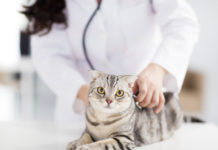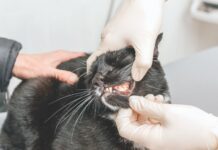Q. Dear Elizabeth: Recently one of my cats has taken to using my asparagus bed for a litter box. Does this make the asparagus unsafe to eat? If so, will cat diseases linger in the soil for a long time? Thank you, Green Thumb
A. Dear Green, I’m sorry, but not surprised, to hear about your kitty’s decision to use your garden as a litter box. While this may be convenient and feel natural to your baby, however, there are some potential concerns regarding zoonotic diseases (i.e., diseases that humans can catch from animals) that you should be aware of.
Toxoplasmosis is caused by the protozoal parasite Toxoplasma gondii, which requires passage through a cat to produce infective oocysts that can subsequently infect other warm-blooded animals. Cats usually acquire toxoplasmosis by eating infected prey, and approximately 20 percent of cats will begin to shed toxoplasma oocysts in their feces after ingesting toxoplasma.
Oocysts in cat feces take between 24 and 48 hours to become infective for other animals, so if you are able to remove the feces from your garden within 24 hours (wearing gloves and washing hands thoroughly afterward), you will significantly decrease the likelihood of having your vegetables be a source of toxoplasma infection.
Irrespective of whether you are able to do this, all vegetables from your garden should be washed thoroughly before preparation for meals. Oocysts can survive for years in moist soil, and the degree of environmental contamination can be quite high. Toxoplasmosis does not cause problems in most people, but immunosuppressed individuals are more susceptible to developing symptoms of toxoplasmosis, which may range from mild flu-like symptoms to potentially life-threatening central nervous system disease. Of particular concern is the possibility of pregnant women ingesting toxoplasma oocysts, as toxoplasmosis can cause serious health problems for a developing human fetus.
Other protozoal parasites that may be passed on to humans by cat fecal contamination of food items and/or water sources include cryptosporidium and giardia. These organisms most commonly cause gastrointestinal signs such as diarrhea in affected people, and regular checkups with your veterinarian and treatment, where appropriate, can minimize the likelihood of your kitty passing these bugs onto humans who eat contaminated food or water. Giardia and cryptosporidium are passed almost exclusively via contaminated water sources, and they do not survive well in dry soil, so it is not likely that your kitty will pass these on via defecating in your garden.
Salmonella is a bacteria that can cause diarrhea in affected cats. Although unlikely, it is possible that humans who eat food items contaminated with cat feces may contract salmonellosis. The best way to minimize this possibility is to thoroughly clean all vegetables from your garden before to preparing them for meals.
Another potential cause for concern is intestinal parasites. Roundworm and hookworm eggs may be shed in cat feces and persist for a long time in the environment. Eating vegetables that have been contaminated with cat feces may expose humans to infestation by these parasites. Roundworm infection can cause a syndrome called visceral larval migrans in people, which is caused by the larvae of the roundworm migrating through the tissues of an infected person. Regular fecal examinations in your cat and appropriate anti-parasitic therapy will minimize the likelihood of people becoming infected with these parasites by eating vegetables contaminated with cat feces.
The following recommendations will decrease the risk of humans contracting the above mentioned conditions from your asparagus garden:
-Carefully wash all food items from your garden before preparing them.
-Wear gloves when working in your garden, and wash hands thoroughly after doing so.
-Be careful with children, immunosuppressed individuals and pregnant women who may be working in or handling food items from your garden. It is best to not have these individuals working in a garden that may have been contaminated with cat feces. If people falling into these categories do work in a garden, assure that they wear gloves and wash their hands thoroughly after doing so.
-Make sure that your cat visits your veterinarian for regular checkups, and follow your veterinarian’s recommendations regarding treatment and prevention of infestations/infections.
I hope that this information is helpful and that you continue to eat your vegetables. If you would like more information on this topic, visit the Cornell Feline Health Center website at www.cornell.edu.
-Best regards, Elizabeth



